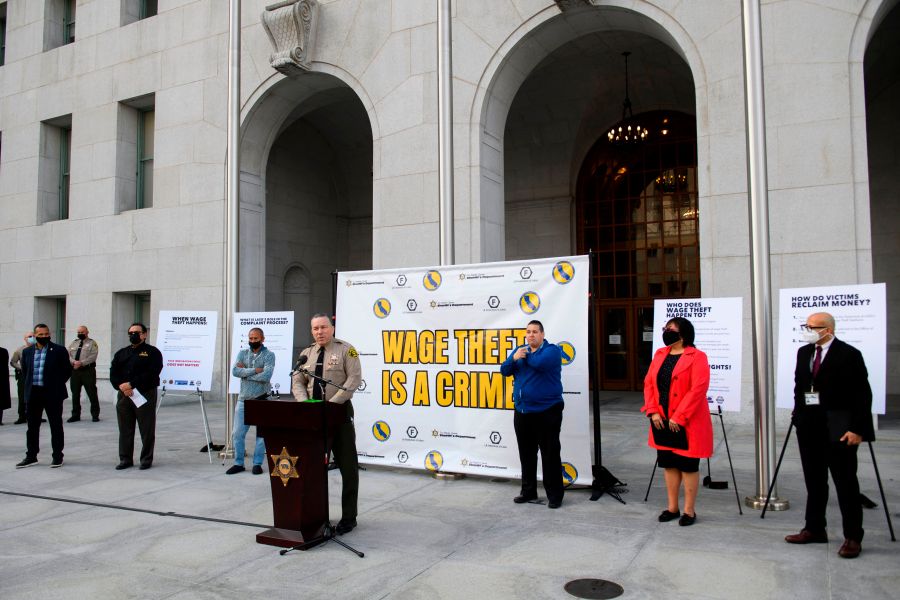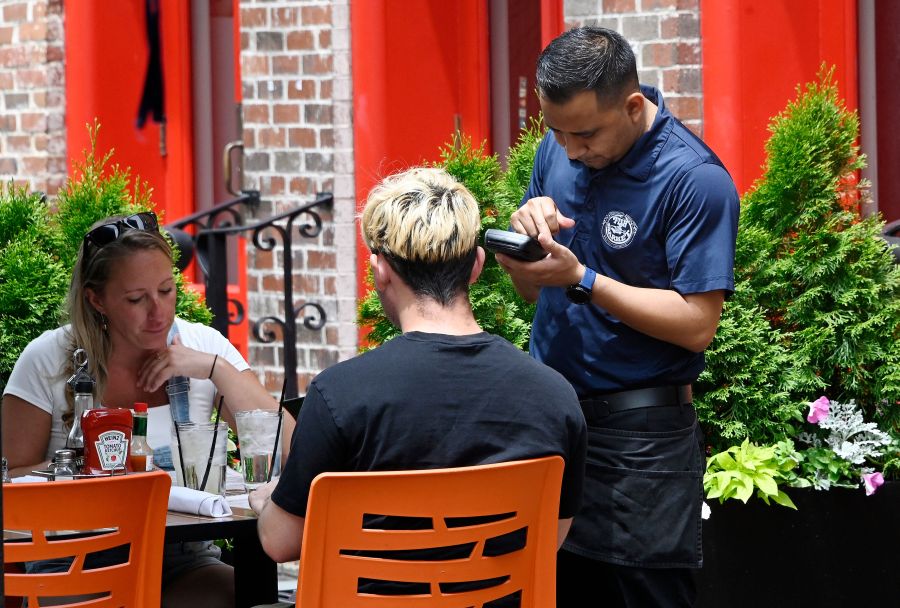Uber rides to McDonald’s fries: This D.C. battle hits everyone
- Biden’s labor secretary nominee is a litmus test for new worker regulations
- Julie Su has tried to change how gig workers and restaurants staff are paid
- Businesses say her policies risk the supply chain and will increase costs

Julie Su, nominated by President Joe Biden to serve as the Secretary of Labor, listens as Biden speaks about her during an event in the East Room of the White House in March (AP Photo/Susan Walsh, File)
(NewsNation) — Behind the Washington politicking over who should run the U.S. Department of Labor is something more important: a tug-of-war over worker protections versus the concern that regulations slow the American economy.
At the center is Julie Su, the former labor secretary of California and the only Biden Administration cabinet secretary who has not been confirmed by the U.S. Senate. The things Su is known most for touch millions of Americans: from anyone who drives an Uber to fast-food workers who think their bosses cheated them out of a full day’s pay.
Depending on your perspective, a Labor Department under Su would either win billions of dollars in pay and benefits for American workers or could damage the economy and weaken America’s fragile supply chain.
The date of Su’s confirmation vote has dragged on as the Biden administration tries to line up votes in the Senate. It could happen as early as this week.
Here’s how this political debate impacts all of America.
Gig economy reform
Su supported and enforced a California law that put strict limits on when companies could classify employees as “independent contractors.”
Known as AB5, it specifically targeted so-called gig-economy companies like Uber and Grubhub, as well as the trucking industry. These companies called their drivers independent contractors and, as a result, those workers didn’t qualify for benefits like unemployment insurance and health care.
For Su and other advocates, the law protected people who worked exactly like full-time employees but didn’t get the benefits — and in many cases were paid below minimum wage. Opponents, though, argued that these gig workers liked the flexibility of their work and now were going to lose it.
If California’s law is ever fully enforced, it would mean companies like Uber and Lyft would spend hundreds of millions of dollars more a year to give workers benefits.
However, months after it passed, California voters approved a new measure supported by gig-economy businesses, which essentially reversed AB5. Both of these rules are winding their way through California’s court system.
The Biden administration is reviewing similar restrictions for companies that employ gig workers right now. It includes a move to define employees as those “economically dependent” on their employer, which would restrict who can be classified as an independent contractor.
Su, if confirmed, would enforce this new rule.
‘Wage theft champion’

Business groups have objected to Su’s nomination, pointing to her work as California’s labor secretary, where she aggressively pursued labor law violations, including wage theft.
Wage theft can take several forms: from asking employees to work while off the clock to refusing to pay overtime.
Su has been at the front of fights for fair pay for a long time, first becoming well-known for her work on behalf of low-wage workers and immigrant workers. She launched the “Wage Theft Is a Crime” campaign, which worked to educate low-wage workers about their rights and gave them information on how to report labor abuses.
The Labor Department is responsible for enforcing rules against wage theft, along with state departments of labor and attorney generals, as well as the court system. Between 2017 and 2020, those agencies collectively recovered $3 billion in wages that weren’t paid out.
While low-income workers are the ones most affected by wage theft, it can happen in all industries. It also impacts national and local economies when employers aren’t paying into programs, like unemployment insurance, that workers rely on. One study found that, on the federal level, wage theft, in the form of not paying taxes, accounted for $91 billion in lost tax revenue.
Business groups have argued enacting more legislation around wage theft will be damaging to private businesses and commercial real estate. Some also argued Su’s efforts to fight wage theft were part of a special interest campaign from labor unions.
Franchise workers

Su is also part of a hotly disputed movement to change how fast-food workers are paid in California, which is already spreading across the country. It could change how restaurant franchises are run nationwide.
She supported the FAST Act, which created a 10-member council that will regulate everything from wages to working conditions for fast-food workers. Any business in California that has 100 stores nationwide would answer to the council, which will include union members, fast-food workers and employers.
The Act is meant to address the fact most fast-food workers live close to the poverty line. It’s expected the council will increase the minimum wage for fast food workers to $22 an hour.
But California’s Finance Department opposed the bill because of increased costs. The U.S. Chamber of Commerce, meanwhile, points out the law would make franchisors, such as the McDonald’s corporation, responsible for violations by the smaller businesses that run its restaurants as franchisees. This will also increase costs, the Chamber stated.
The Act is on hold until residents vote in November 2024 on whether to approve the measure. Meanwhile, Virginia and New York are now considering their own versions.
The Biden administration has also pushed for rules that would make large franchises such as McDonald’s jointly responsible for wages and working conditions in their individual locations owned by local business owners. Supporters say the current model allows big companies to dodge responsibility for poor conditions by shifting the burden to individual franchise owners.
Ending the ‘tip credit’

Americans are pushing back against tipping. But there’s a bigger question: whether companies should be allowed to use tips to pay a lower hourly wage.
Forty-two states have a “tip credit,” which lets employers pay tipped workers, like wait staff and bartenders, less than minimum wage.
Cities and states across the country are reconsidering the tip credit. Opponents of Su say she would target the tip credit based on some of her past remarks (though she has not been involved with specific legislation).
As many as 5.5 million workers are in jobs that qualify for the tip credit. If an employee does not receive enough tips to make up the difference, the employer is supposed to pay out that money to bring the worker up to minimum wage. But workers say, in reality, that doesn’t happen.
Supporters of the tip credit say it allows workers to take home more than the minimum wage and argue efforts to remove it are robbing workers of their livelihood. Rather than helping workers, they say removing the tip credit will result in a loss of jobs because employers would not want to hire as many workers if they had to pay minimum wage.
However, research showed that eliminating the tip credit didn’t result in any additional closures of restaurants, nor did it result in customers leaving smaller tips. They also argue the tip credit disproportionately affects workers of color who are more likely to work in less expensive establishments, while white workers tended to work industries like fine dining, where tips tend to be larger.
Some research found states with no tip credit actually saw more job growth than those that allowed the tip credit system.
While the Biden administration has not moved to completely eliminate the tip credit, there have been efforts to tighten regulations around it. Most notably, that includes a rule which limits the amount of time tipped workers can do non-tipped work, like rolling silverware or other back-of-the-house work, and requiring employers to pay a full minimum wage for time spent doing non-tipped work.










